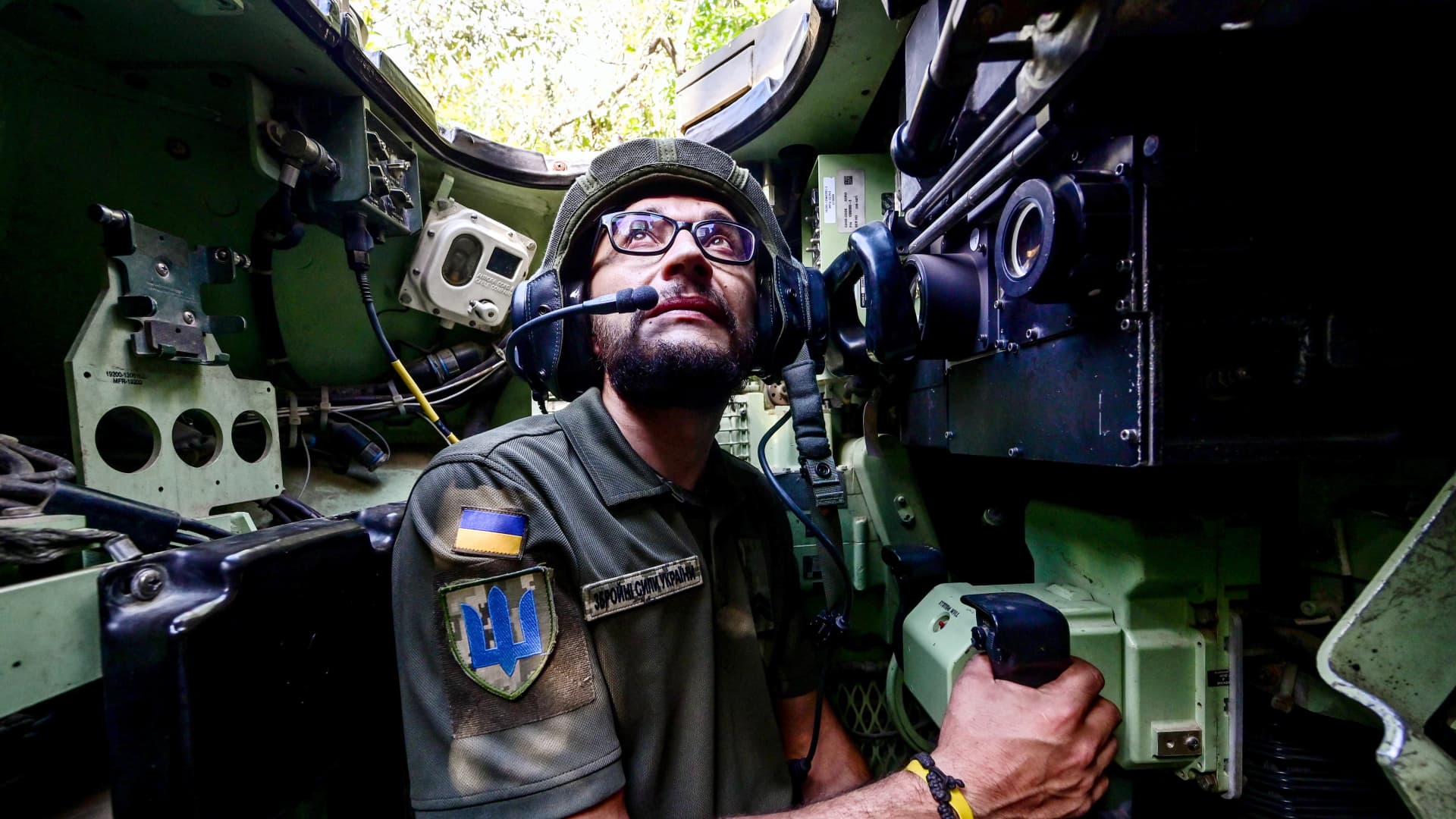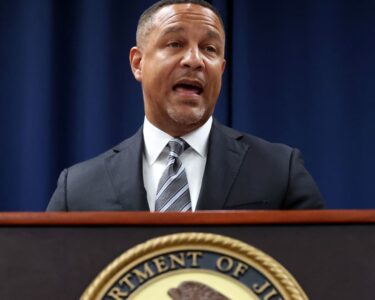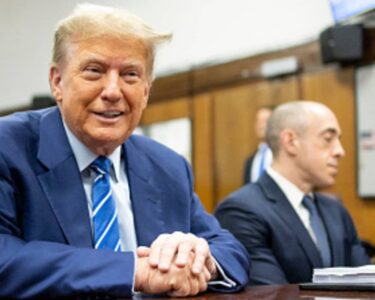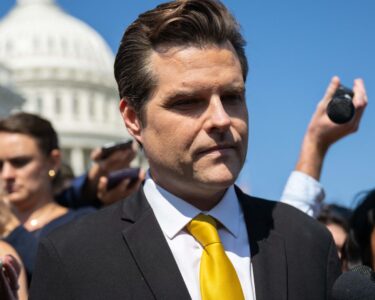This was CNBC’s live blog tracking developments on the war in Ukraine. See here for the latest updates.
Ukrainian President Volodymyr Zelenskyy addressed the U.N. Security Council on Wednesday in a meeting that is expected to see him come face to face with Russian Foreign Minister Sergey Lavrov.
Zelenskyy, Lavrov and U.S. Secretary of State Antony Blinken were among the delegates at the meeting at which Lavrov is expected to speak, and at which Ukraine’s leader is expected to present Kyiv’s peace plan.
When asked whether he would stay to listen to Lavrov, Zelenskyy said Monday: “I don’t know how it will be, really,” AP reported.
At the wider U.N. General Assembly on Tuesday, U.S. President Joe Biden called on world leaders to continue to support Ukraine against Russia’s “illegal war of conquest.” Addressing the assembly for the first time, Zelenskyy made an impassioned speech focused on the dangers that he said Russia posed to the international community. On Thursday, Zelenskyy is due to travel to Washington to meet Biden.
Ukraine’s President Zelenskyy on Wednesday called for Russia to lose its veto power within the U.N. Security Council.
In an address in New York, Zelenskyy said the move was a necessary step in bringing an end to the fighting in his country.
“It is impossible to stop the war because all efforts are vetoed by the aggressor,” he said, adding that reforms of the council were long overdue.
“I know that the U.N. is capable of more. I’m confident that the U.N. Charter can actually work for the sake of peace and security globally. However, for this to happen, the years-long discussions and projects on U.N. reform must be translated into a viable process of UN reform,” he said.
— Karen Gilchrist
Poland summoned the Ukrainian ambassador in the country Wednesday, as it hit back at President Volodymyr Zelenskyy’s comments regarding its restrictions on Ukrainian agricultural imports.
“[Deputy Foreign Minister Pawel Jablonski] conveyed the Polish side’s strong protest against the statements made by President V. Zelenskiy at the U.N. General Assembly yesterday, alleging that some EU countries feigned solidarity while indirectly supporting Russia,” the foreign ministry said in a statement, as reported by Reuters.
Ukraine’s foreign ministry spokesman Oleg Nikolenko said Ukraine had offered a “constructive path to resolve the grain issue.”
Ukraine has heavily criticized Poland, Hungary and Slovakia for last week introducing bans on the domestic import of various Ukrainian agricultural products following the expiration of EU-led limitations on imports covering the three countries, as well as Romania and Bulgaria.
Products may transit the countries but not be sold there.
Land export routes have become crucial for Ukraine following the suspension of the Black Sea Grain Initiative, but farmers argue imports will overwhelm supply and cause a depression in prices if not restricted.
The EU had urged countries not to introduce divergent policies on the matter, as Ukraine agreed to introduce measures to prevent a supply glut, but national leaders argued this was insufficient.
Ukraine has filed a complaint with the World Trade Organization over the issue, thought to target Poland, Hungary and Slovakia.
Polish and Ukrainian officials have in turn suggested they may introduce further retaliatory trade curbs as the dispute has escalated.
Romania on Wednesday announced it would work with Ukraine on a plan to control exports.
— Jenni Reid
U.S. President Joe Biden plans to announce a significant military aid package for Ukraine on Thursday to coincide with a visit to Washington by President Volodymyr Zelenskyy, a U.S. official said on Wednesday on condition of anonymity.
— Reuters
In the early hours of Tuesday, Sept. 19, the Russian army reportedly launched 18 Shahed one-way attack drones in the direction of Lviv Region.
Three UAVs hit industrial warehouses in Lviv. The attack destroyed a humanitarian warehouse with 300 tons of relief supplies.
— Ukrinform | NurPhoto | Getty Images
Armenian separatist forces in Azerbaijan’s breakaway region of Nagorno-Karabakh surrendered and agreed to a ceasefire on Wednesday, 24 hours after Baku began an offensive to restore full control of its territory.
Under the agreement, confirmed by both sides and effective from 1 pm (0900 GMT) on Wednesday, separatist forces will disband and disarm and talks on the future of the region and the ethnic Armenians who live there will start on Thursday.
Separatists running the self-styled “Republic of Artsakh” said they had been forced to agree to Azerbaijan’s terms — relayed by Russian peacekeepers — after Baku’s army broke through their lines and seized a number of strategic locations while the world did nothing.
“The authorities of the Republic of Artsakh accept the proposal from the command of the Russian peacekeeping contingent to cease fire,” they said in a statement.
Azerbaijan confirmed a ceasefire deal had been reached.
The outcome would appear to pave the way for Azerbaijan to integrate around 120,000 ethnic Armenians into its society – a prospect some Armenians say they fear – and to take full control of a mountainous area that has been at the center of two wars since the 1991 fall of the Soviet Union.
Armenia, which says it has no military forces in Karabakh despite Azerbaijani assertions, did not intervene militarily. It has accused Baku of trying to ethnically cleanse Karabakh, something Azerbaijan has denied.
It was unclear how many ethnic Armenians would opt to stay in Karabakh or whether there would be a large exodus to Armenia.
— Reuters
The Russian-installed governor of Crimea said air defense forces have repelled a missile and drone attack on Sevastopol, the home of Russia’s prized Black Sea fleet.
Posting on Telegram, the Russia-appointed Governor of Crimea Mikhail Rasvoszhaev said “air defense forces repelled a missile attack on Sevastopol.”
“Now everything is calm in the city. Information on possible damage from fallen parts of downed missiles and casualties is being clarified. All emergency services are working.”
Earlier, Rasvoszhaev said air defense systems in the occupied peninsula had downed several drones, with falling debris starting a small grass fire. CNBC was unable to immediately verify the information.
Crimea has been the target of an increased number of missile and drone attacks in recent months with Sevastopol, the home port of Russia’s Black Sea Fleet, a main target as well as oil depots. Last week, a shipyard in Sevastopol was attacked with two Russian naval vessels and a submarine damaged.
Ukraine rarely comments on such attacks but the liberating of Crimea remains a key aim for Kyiv, which aims to retake all of its territory currently occupied by Russia. Crimea was annexed by Moscow in 2014.
— Holly Ellyatt
European Council President Charles Michel will ask China directly at the United Nations Security Council to do more to push Russia towards a “just peace” in Ukraine, according to his draft speech seen by Reuters at the UNGA.
At the Security Council meeting held on Wednesday during the annual high-level U.N. General Assembly in New York, Michel will call for “a just peace that respects the U.N. Charter and its core principles — the territorial integrity of a sovereign nation.”
Michel will then turn directly to the Chinese delegation to say: “As responsible nations, let’s join forces – to persuade Russia to end this criminal war that is hurting so many,” the draft says.
China’s Vice President Han Zheng is in New York for the annual gathering of world leaders for the UNGA, and is currently expected to attend the meeting of the 15-member council for China, diplomats said.
Ukrainian President Volodymyr Zelenskyy is also expected to attend the council meeting.
China has abstained from votes by the 193-member U.N. General Assembly that overwhelmingly demanded that Moscow withdraw its troops from Ukraine and stop fighting. Russia invaded its neighbour in February 2022.
China’s abstentions appeared to reflect a bid to stay on the diplomatic fence over the war in Ukraine. Beijing has said the sovereignty and territorial integrity of all countries must be respected, but — in a nod to Russia’s unease about NATO — believes all security concerns should be addressed.
— Reuters
The Kremlin slammed U.S. President Joe Biden’s remarks at the U.N. General Assembly.
Addressing the assembly in New York on Tuesday, Biden urged world leaders to continue to support Ukraine against Russia’s “illegal war of conquest,” saying “Russia believes that the world will grow weary and allow it to brutalize Ukraine without consequence.”
“If we allow Ukraine to be carved up, is the independence of any nation secure? I’d respectfully suggest the answer is no. We must stand up to this naked aggression today to deter other would-be aggressors tomorrow,” he said, to applause. “Russia alone has the power to end this war immediately. Russia’s price for peace is Ukraine’s capitulation, Ukraine’s territory and Ukraine’s children.”
Biden did not mention Putin by name during the speech. But when asked on Wednesday by reporters to comment on Biden’s remarks, Kremlin Press Secretary Dmitry Peskov said Putin “never stoops to that level of discussion and never will do.”
“Putin enjoys a very high level of support. Biden has never reached Putin’s level of public support,” Peskov added, in comments translated by NBC News.
— Holly Ellyatt
The Kremlin on Wednesday rejected Armenian assertions that Russia had not done enough to prevent fighting in Nagorno-Karabakh, saying the matter concerned Azerbaijan’s actions on its own territory.
Azerbaijan forces pounded Nagorno-Karabakh on Wednesday, killing at least 32 people, according to Armenia, and wounding many more in the breakaway region controlled by ethnic Armenians, despite calls from Russia and the United States to cease fighting.
Kremlin spokesperson Dmitry Peskov said Russia was continuing contacts with Armenia, Azerbaijan and ethnic Armenians in Karabakh.
Peskov said the timing of a phone call between President Vladimir Putin and Armenian Prime Minister Nikol Pashinyan was still being determined.
The Interfax news agency reported that separatist ethnic Armenian forces in Nagorno-Karabakh had agreed to the terms of a ceasefire proposed by Russian peacekeepers.
— Reuters
Moscow’s attempts to bolster its forces in the southern region of Zaporizhzhia has left its units in the Bakhmut area of Donetsk more vulnerable, according to Britain’s Ministry of Defense on Wednesday.
“Recent redeployments of Russian airborne forces from Bakhmut to Zaporizhzhia in southern Ukraine have likely weakened Russia’s defenses around Bakhmut,” the ministry said in an intelligence update on X, formerly Twitter.
In the past week, Ukraine claimed to have liberated the villages of Klishchiivka and Andriivka, a few miles south of Bakhmut in Donetsk. Russia said the settlements are in a “gray zone” and are still being contested.
Britain’s Defense Ministry observed that Ukraine’s “tactical success brings Ukrainian forces closer to the T 05-13 road, one of the main supply routes into Bakhmut from the south” but it noted that “Russia continues to hold the railway line which runs along an embankment between Klishchiivka and the T 05-13, creating a readily defendable obstacle.”
— Holly Ellyatt
Russian losses in the southern Zaporizhzhia region of Ukraine have increased significantly as Ukraine’s counteroffensive makes gains, according to an analysis from the Institute for the Study of War, released late on Tuesday.
Ukraine has reported a number of advances in the last week in the south and east, with the recapture of two villages — Andriivka and Klishchiivka — just south of Bakhmut in Donetsk. It’s a notable victory, although Russian officials say the settlements are still being contested.
The ISW noted in its analysis that “Russian and Ukrainian sources credited superior Ukrainian combat coordination, more precise artillery fire, and stronger electronic warfare systems for recent Ukrainian advances south of Bakhmut amid continued discussions of significant Russian losses in the area.”
After recent reports of a Ukrainian breakthrough in one of three main layers of Russian defenses in southern Ukraine, the country’s armed forces appear to be building on gains. The ISW noted that “Russian losses have reportedly significantly increased in western Zaporizhzhia Oblast [region] in recent days, and the Russian military likely struggles with a lack of available combat-effective units that the Russian command is willing to laterally redeploy to this sector of the front.”
The spokesperson for Ukraine’s Tavria region’s forces operating in the south, Colonel Oleksandr Shtupun, stated in a national telethon Monday evening that Russian forces lost 313 soldiers on Sept. 18 and that this had “significantly increased” since the previous two days, in which an estimated 200 Russian soldiers had been killed each day.
More than 5 square kilometers of territory in the south had been liberated in the past week, Shtupun said, and Russia was pulling up its reserves. Shtupun stated that Russian Airborne Forces had been drawn in to conduct defensive operations in region and that “Storm-Z” units, made up of Russian convicts, have also been observed.
— Holly Ellyatt
Russian Foreign Minister Sergey Lavrov arrived in New York last night “to participate in the political week of the U.N. General Assembly,” Russia’s Foreign Ministry said on Telegram.
Lavrov missed the first day of the 78th session of the U.N. General Assembly, during which U.S. President Joe Biden and Ukrainian President Volodymyr Zelenskyy separately addressed the assembly, both making impassioned calls to global leaders to continue their support for Ukraine and warning of the dangers Russia’s poses to global peace.
He is due to the attend the U.N. Security Council meeting on Wednesday, where he could encounter Zelenskyy.
Russia’s Foreign Ministry said in a post that Lavrov “will take part in a number of multilateral events, including those organized by the UN Security Council, BRICS, CSTO [the Collective Security Treaty Organization, an intergovernmental military alliance in Eurasia] and the Group of Friends for the Defense of the UN Charter. Events are also planned within the SCO [Shanghai Cooperation Organisation].”
In addition, the ministry said, Lavrov intends to hold about 20 bilateral meetings with colleagues from various states and heads of international organizations. A conversation with U.N. Secretary-General Antonio Guterres is also planned.
Lavrov will address the U.N. General Assembly on Sept. 23.
— Holly Ellyatt
Ukrainian President Volodymyr Zelenskyy is due to address the U.N. Security Council on Wednesday in a meeting that is expected to see him come face to face with Russian Foreign Minister Sergey Lavrov.
Russia’s Foreign Ministry confirmed last night that Lavrov had arrived in New York for the meeting, with posts on Telegram showing Lavrov greeting Russia’s Permanent Representative to the U.N. Vasily Nebenzya and Russian Ambassador to the U.S. Anatoly Antonov.
Russia is one of five permanent members (along with the U.S., U.K., France and China) of the U.N.’s Security Council, a body responsible for maintaining global peace and stability. It has faced calls for its removal since invading Ukraine in February 2022.
Zelenskyy, Lavrov and U.S. Secretary of State Antony Blinken are among the delegates expected at the meeting Wednesday, at which Lavrov is expected to speak and where Ukraine’s leader is expected to present Kyiv’s peace plan.
“Last year, I presented the outlines of the Ukrainian peace formula at the UN General Assembly and later and Indonesia I presented the full formula. And over the past year, the peace formula became the basis to update the existing security architecture,” Zelenskyy said as he addressed the U.N.’s General Assembly on Tuesday.
“Now we can bring back to life the UN Charter and guarantee the full power for the rules based world order. And tomorrow, I will present that at a special meeting of the UN Security Council.”
— Holly Ellyatt
U.S. Secretary of Defense Lloyd J. Austin has urged members of the Ukraine Defense Contact Group, an alliance of around 50 countries, to “continue to dig deep on ground-based air defense for Ukraine.”
Austin said the group had “stepped up” with donations of Patriot, IRIS-T, HAWK, NASAMS, SAMP/T, and other air-defense systems, and that this was saving lives.
“We must continue to push hard to provide Ukraine with the air-defense systems and interceptors that it needs. And right now, in the heat of battle, we must also keep pushing to get Ukraine the ammunition that it needs to keep up the fight, including 155-millimeter ammunition,” he said.
However, no announcements were made at the meeting regarding increased supply of long-range missiles, which Ukraine has repeatedly called for.
This includes Army Tactical Missile Systems, or ATACMS, which have a reach of up to 190 miles (306 km). U.S. supply of ATACMS reportedly remains under discussion.
— Jenni Reid
A Moscow judge suspended journalist Evan Gershkovich’s latest appeal against his pre-trial detention on spying charges, according to NBC News.
The judge said there were “procedural violations” that need to be resolved and sent the appeal back to be heard in a lower court.
Gershkovich, his employer the Wall Street Journal and the U.S. government have strongly denied allegations of spying, and say he was doing his job as a reporter when he was detained in March.
Previous appeals by Gershkovich failed in April and June. His pre-trial detention was extended to Nov. 30 in August, and no date has been set for his trial.
— Jenni Reid
Eyewitness accounts and an analysis of video and weapon fragments suggest a Ukrainian missile that failed to hit its intended target was the cause of a deadly strike on a Ukrainian market in September, The New York Times reported Monday.
The missile strike on a market in Kostiantynivka killed at least 16 civilians and injured more than 30 others and was initially blamed on Russia. President Volodymyr Zelenskyy said it was a “deliberate terrorist attack,” following numerous other incidents of Russian attacks on civilian infrastructure. Russia denies targeting civilians.
However, evidence collected and analyzed by The New York Times — including missile fragments, satellite imagery, witness accounts and social media posts — “strongly suggests the catastrophic strike was the result of an errant Ukrainian air defense missile fired by a Buk launch system,” the newspaper said in a report published Monday.
“The attack appears to have been a tragic mishap. Air defense experts say missiles like the one that hit the market can go off course for a variety of reasons, including an electronic malfunction or a guidance fin that is damaged or sheared off at the time of launch,” the paper said.
The likely missile failure happened amid the back-and-forth battles common in the surrounding area, the paper added, with Russian forces having shelled Kostiantynivka the night before.
A spokesperson for Ukraine’s armed forces told the NYT the country’s security service is investigating the incident, and under national law can’t comment further.
— Holly Ellyatt
Russian President Vladimir Putin will meet his Chinese counterpart Xi Jinping for talks in Beijing in October, a close ally of Putin said Tuesday.
“In October, we are counting on detailed bilateral negotiations between Russian President Vladimir Putin and Chinese President Xi Jinping in Beijing,” Nikolai Patrushev, the secretary of Russia’s Security Council, said at a meeting with Chinese top diplomat Wang Yi, according to the Interfax news agency.
He said the talks would take place as the international “One Belt, One Road” forum is held in Beijing. Putin will attend the gathering after Xi extended an invitation to him during a high-profile visit to Moscow in March.
The visit to Beijing will be the first that Putin has made since an international arrest warrant was issued for Putin alleging responsibility for the unlawful deportation and transfer of children during the war in Ukraine. The Kremlin denies the allegations.
— Holly Ellyatt
Ukrainian President Volodymyr Zelenskyy could be coming face to face with top Russian officials this week as he prepares to address global leaders at the U.N. General Assembly on Tuesday.
Zelenskyy is also due to speak at a U.N. Security Council meeting about Ukraine on Wednesday, an event that could see him in the same room as Russian Foreign Minister Sergey Lavrov, who is also expected to address the Council.
When asked on Monday whether he would stay to listen to Lavrov’s remarks, Zelenskyy said “I don’t know how it will be, really,” AP reported.
Russia is one of five permanent members of the U.N. Security Council, and like its other permanent members (the United States, Britain, China and France), it has the power of veto U.N. resolutions; Russia vetoed a Security Council resolution last year condemning the attempted annexation of four Ukrainian regions, for example.
Ukraine has repeatedly questioned how and why Russia continues to occupy a top position in the U.N. when it has itself invaded its neighbor and fostered war and instability.
In his nightly address, Zelenskyy said “territorial integrity of the state is a key principle of all basic international documents, including the UN Charter. And it is necessary to return to it the full force destroyed by the Russian invasion, and to increase the capabilities of the UN to stop aggressions and prevent them. Ukraine will make a clear proposal in this regard to UN members.”
Zelenskyy arrived in New York on Monday, where he visited Northwell Health’s Staten Island University Hospital to recognize efforts to support medical providers in Ukraine. He also met wounded Ukrainian soldiers who had received advanced prosthetics and critical rehabilitation after being severely injured in the Russian invasion.
— Holly Ellyatt
Biden urges world to continue support for Ukraine at UN summit; Putin and Xi to meet next month






